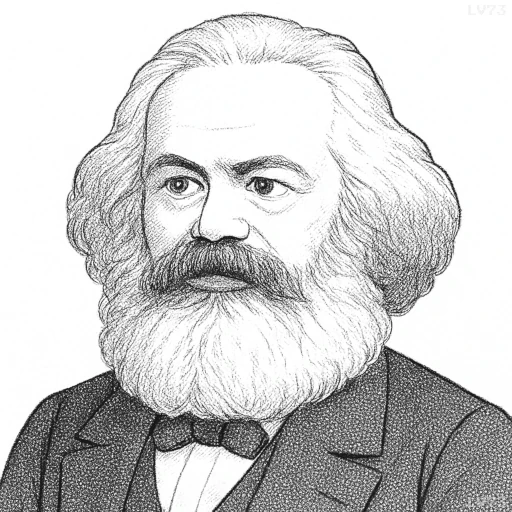“Society does not consist of individuals but expresses the sum of interrelations, the relations within which these individuals stand.”

- May 5, 1818 – March 14, 1883
- Born in the Kingdom of Prussia (Germany)
- Philosopher, economist, political thinker
table of contents
Quote
“Society does not consist of individuals but expresses the sum of interrelations, the relations within which these individuals stand.”
Explanation
In this quote, Marx emphasizes that society is not simply the collection of individuals but is instead shaped by the relationships and interconnections between individuals. Society, for Marx, is defined by the social relations that structure how people interact, produce, and organize their lives. These relations—whether economic, political, or social—are what define the functioning of society as a whole. The quote suggests that individuals can only be understood within the context of these broader relations and structures, rather than as isolated, independent entities. Marx’s theory of historical materialism posits that the organization of society, particularly its economic system, determines the social relations, which in turn shape the consciousness and behaviors of individuals. Therefore, individual actions cannot be fully understood without considering the collective social forces that influence them.
Historically, this quote underscores Marx’s break from classical individualist theories of society, which focus on the rights and actions of individuals as the basis for understanding social life. In contrast, Marx argued that it is the economic base (the mode of production) and the social relations that define how individuals interact, and ultimately, how history unfolds. For instance, in a capitalist society, individuals are defined not just by their personal characteristics but by their class position (worker, capitalist, etc.) and the relations of production (e.g., wage labor, capital accumulation). These relationships form the economic structure of society and influence everything from political power to individual identity.
In modern contexts, Marx’s view helps explain that social issues like inequality, racism, or gender discrimination are not simply the result of individual attitudes or actions but are deeply embedded in the social systems and economic relations that govern society. For example, class struggles are not merely the result of individual actions but reflect broader economic structures that pit the working class against the capitalist class. Similarly, the interconnectedness of global capitalism, where actions in one part of the world (like labor exploitation in developing countries) impact individuals in another (such as consumer choices in wealthy countries), shows how society is shaped by global interrelations. Marx’s perspective invites us to consider how society as a whole, through its social, economic, and political relations, shapes the lives and experiences of individuals, rather than attributing social phenomena solely to the actions of individuals.
Would you like to share your impressions or related stories about this quote in the comments section?
